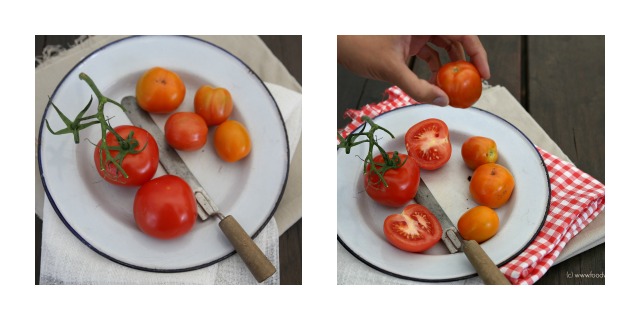- Home
- Blog
- Super Foods
- Super foods, the ultimate health foods – Tomatoes
Super foods, the ultimate health foods – Tomatoes
Written by Catherine Saxelby
on Friday, 27 February 2009.
Tagged: diet foods, food variety, fresh food, salad, super foods, superfoods, vegetables, vegetarian, vitamins

Cherry, egg, vine-ripened, ox-heart or teardrop; raw, grilled, oven-roasted or sun-dried; canned, bottled or in paste form - whichever way you eat them, tomatoes are a versatile ingredient of any healthy diet and a top super food.
Tomatoes score so high for nutrition. They:
- Are the best source of lycopene in our diets - see below
- Contribute vitamin C
- Are good for fibre
- Supply folate and other B vitamins
- Give you lots of the mineral potassium
- Won't make you fat - 1/2 tomato has a mere 36 kilojoules (9 calories).
Is it a veggie or a fruit?
Eaten as a vegetable, but botanically classified as a fruit, tomatoes are our second favourite vegetable after potatoes. Much of this intake is in the form of tomato products like canned whole tomatoes, tomato pasta sauces, tomato paste, juice and more recently as sun-dried. And of course there's that humble childhood icon, tomato sauce.
Lycopene
The rich red colour of tomatoes isn't merely attractive to look at. It's due to lycopene, a strong antioxidant which has been shown to reduce the risk of cancer of the prostate and possibly cancer of the colon, bladder and lungs. And it appears to protect white blood cells, your body's first line of defence against infection. Several studies found that men who have the highest intakes of lycopene from tomato-based foods had a much lower risk of prostate cancer.

Cooked tomatoes are just as healthy
Interestingly processed tomato products - spaghetti sauces, tomato sauce, tomato juices - provide the most lycopene. Cooking and processing softens the tough cell walls of the tomato and increases the availability of the lycopene.
Tomatoes and arthritis
Tomatoes are sometimes avoided by arthritis sufferers, along with other members of the nightshade family like capsicum and eggplant. Reasons given are that they are too "acid" or cause a flare-up of swollen joints or stiffness.
Tomatoes and food intolerance
Along with their flavour, tomatoes contain high levels of salicylates, amines and glutamates, three natural compounds that are often the villains in migraines, digestive upsets and other allergic-type reactions collectively called food sensitivity. As with other culprit foods, it seems if a food consistently causes problems for someone, then it's best to avoid it (and it's estimated that around 30 % of arthritis sufferers have some sort of food intolerance).
At this stage, however, there's not enough evidence to ban tomatoes for everyone with arthritis. But if they upset your joints, it's wise to limit them especially the concentrated forms of tomato such as tomato paste or pasta sauce.
Nutrition stats
Per serve:
One medium tomato (weighing 130g or 4oz) supplies: 1g protein, trace of fat, 3g sugar, no starch, 2g dietary fibre and 73 kilojoules (17 calories).
Per 100g:
1 per cent protein, trace of fat, 2 per cent sugars, no starch, 2 per cent dietary fibre and 56 kilojoules (13 calories).
Easy ways to enjoy tomatoes
- Dice a ripe tomato, removing the seeds. Mix with crushed garlic and a little olive oil. Pile the mix onto thick toasted Turkish or ciabatta slices. Add a grind of black pepper and chopped basil leaves.
- Oven-roast Roma tomatoes and stir though risotto with basil, mushrooms and parmesan.
- Seed and dice tomatoes and use as the basis of a quick summer salsa over barbecued steak or grilled chicken pieces. Add chopped fresh basil, finely-chopped purple onion or green spring onions, a squeeze of lemon juice and fresh grind or two of black pepper.
- Snack on tiny cherry or grape tomatoes.
- Add sliced tomato to your sandwiches or melts - it's a perfect partner to cheese or ham (add a little Dijon mustard as well).
Cooking with tomatoes

Try my easy julienne tomato salad which makes a perfect partner to chicken or lamb.
Save
Save
Foodwatch
The Good Stuff
The Boring Stuff
© 2025 Foodwatch Australia. All rights reserved
Website by Joomstore eCommerce





